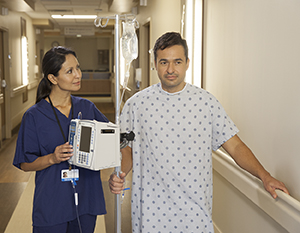Colorectal Surgery: Recovering in the Hospital and at Home
You have had colorectal (bowel) surgery. When the surgery is done, you’ll be taken to the PACU (postanesthesia care unit). Health care providers will closely keep track of your blood pressure, heart rate, breathing, and surgical areas while you wake from anesthesia. You’ll also get pain medicine as needed to keep you comfortable.
You’ll be moved to a regular hospital room when you're stable. You’ll then be watched closely to be sure you’re healing well. Your hospital stay may last from a few days to a week or longer. This depends on how well you progress. Once you are at home, follow instructions to help make sure you have a full recovery.
 |
| Your healthcare provider will help you take short walks soon after surgery. |
Right after surgery
-
If you have a urinary catheter, it will likely be taken out shortly after surgery.
-
Your I.V. (intravenous) line will stay in place for a few days to give you fluids and medicines. You will continue to receive pain medicines from the I.V. until you are able to take pain pills by mouth if needed.
-
Soon after surgery, you’ll be up and walking around. This helps improve blood flow and prevent blood clots. It also helps your bowels get back to normal. This will help prevent a bowel slowing or blockage (ileus). Your health care team will listen to the sounds in your belly (your 'bowel sounds'). This is to make sure your bowels are starting to work normally.
-
You’ll be given breathing exercises to keep your lungs clear and prevent infection.
Stoma Care
If a stoma (ostomy) was made during surgery, your health care providers will show you how to care for it. You may also meet with an ostomy nurse. They will teach you about stoma care. The stoma is an opening in your abdomen where your small or large intestine was connected. It will drain stool and mucus. Some stomas are temporary and some are permanent. It depends on your situation.
Eating again
In some cases, you may need to wait to eat. But many times, you can start eating lightly soon after surgery. This is part of a program for faster recovery. It's called enhanced recovery after surgery.
Recovering at home
In most cases, you’ll visit your health care provider shortly after leaving the hospital. You can get back to your normal routine in the weeks to about a month after surgery. This depends on your situation. Full recovery may take 4 to 6 weeks or longer.
While your body heals, you may tire more easily. You also are likely to have some bloating. Loose stools and more frequent bowel movements are also common. This may get better over time. But it may never fully go away. It will depend on the type of bowel surgery you had and specifics of your case.
Resuming everyday activities
Being active helps your body heal. But you must protect your healing incisions. Make sure you:
-
Walk as much as you feel up to.
-
Don't do any heavy lifting or vigorous exercise until your health care provider says it’s OK. Follow your provider’s advice about climbing stairs and bathing.
-
Don't drive right away. Wait until you’re no longer taking pain medicines. Also wait until you can readily press down on the brake pedal.
When to call your doctor
Contact your health care provider or get medical care right away if you have:
-
A fever of 100.4°F (38°C) or higher, or as directed by your provider.
-
Chills.
-
Nausea or vomiting that doesn't get better.
-
Unusual redness, swelling, drainage, or pain around your incision.
-
Leg pain, redness, or swelling.
-
Unexpected diarrhea, or have not passed gas or had a bowel movement for 24 hours.
-
Belly swelling that gets worse or doesn't go away.
-
Pain in the belly or around the stoma that lasts or gets worse.
Call 911
Call 911 if you have: